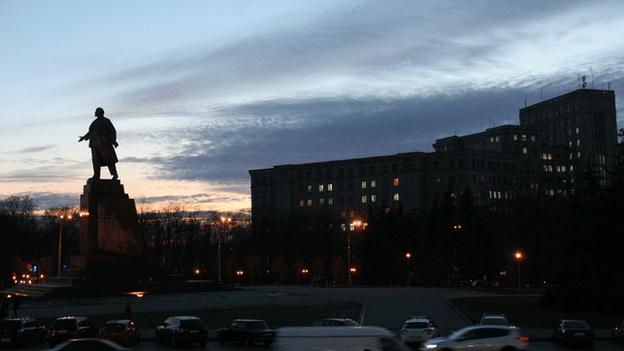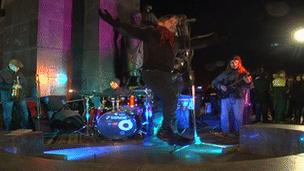Ukraine EU protests: Kharkiv stands aloof
- Published

This statue of Lenin still stands in Kharkiv
"Even prisoners on death row are allowed walks but our Yulia hasn't been out for a year and a half!" complains one of a small group of Yulia Tymoshenko supporters.
She points at the tightly barred windows of the Soviet-style hospital block isolated by forest where Tymoshenko, the imprisoned former prime minister of Ukraine and one of the main supporters of the country's integration into Europe, has been kept over the last 18 months.
There is a small picket of Tymoshenko's supporters at the entrance and the hospital gates are decorated with red roses, but it feels like the recent "European revolution" in Ukraine's capital is a million miles away.
Yevgeny, a 24-old Kharkiv resident visiting the hospital, has been shocked by the cruel crackdown on the students by the security forces but he does not see the point in protesting himself.
"I have to work," he says. "I don't have any time for that sort of fooling around."
Such opinions are shared by many residents of Kharkiv, the second largest city in Ukraine. It is situated near the Russian border and most of its 1.5 million residents speak Russian, at the same time supporting the ruling Party of Regions of President Viktor Yanukovych.
Export fears
It was Mr Yanukovych's refusal to sign the association agreement with the EU that drove the protests in Kiev but in Kharkiv, they had a big rally in support of the government.
If the agreement had been signed, Kharkiv would have suffered heavily, regional governor Mikhail Dobkin argues.
Just weeks before Ukraine was due to sign the association agreement, Russia significantly tightened the custom regulations with Ukraine, making it much more difficult to move goods across the border.
"The things that always have been sold to Russia, and to other countries of the former USSR, were suddenly barred from crossing the border without any reason," says Mr Dobkin.
"There was no direct ban but because of their impossible demands, the lorries stood idle, thus rendering the whole operation commercially useless."
Kharkiv's governor adds that city's heavy industries have always worked closely with Russia, and the factory directors never understood why Ukraine wanted to follow the European path in the first place.
How many Kharkiv residents share this view is debatable. A professor at one of Kharkiv's biggest universities tells the BBC his bosses asked him and all the other staff to take part in a pro-government rally on the city's main square.
The professor, who asks not to be named, says he simply refused to follow the "recommendation".
"They said: 'You have to show up tomorrow at 10:30' but I told them that I didn't have to and I was not going anywhere," he says. "That was the end of the conversation."
'Border mentality'
Kharkiv still has a relatively small, but determined, group of "European revolution" supporters. Every night, some 300 gather on the city's main street near the monument to Ukraine's most famous poet, Taras Shevchenko.

Serhiy Zhadan performed for the protesters
Singing and talking to them is popular writer Serhiy Zhadan, a man with strong connections in the EU who still prefers to live and work in Kharkiv, calling it an "open and comfortable European city".
"Those who come to these demonstrations understand that we are not just talking about some mythical, almost ephemeral European values," he says.
"Our country must finally define its foreign policy. It has to change in general."
Asked why the city's residents are not so keen to protest, Zhadan says Kharkiv has always been a place on the margins.
"I would describe the Kharkiv mentality as defined by borders," the writer says. "You say, a city between Ukraine and Russia? I'd say - between Moscow, Crimea, Kiev and the Caucasus. Of course this location has an impact on the residents' behaviour and their psyche."